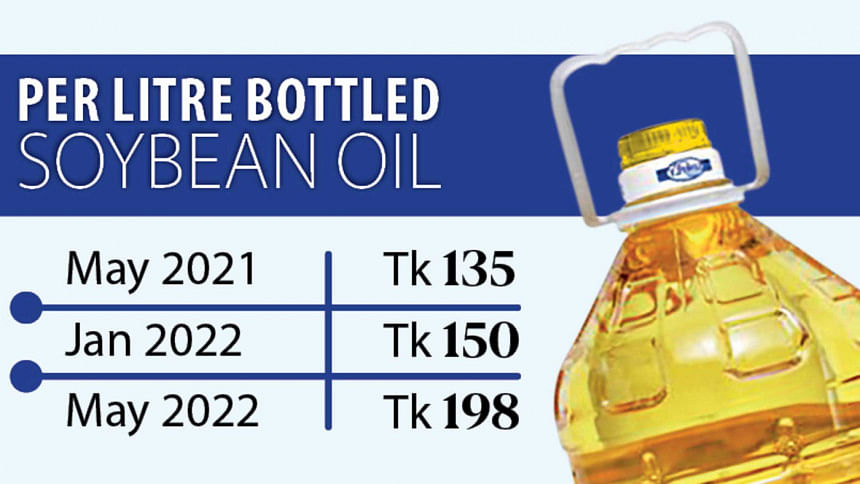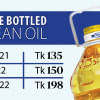Record hike in soybean oil prices

Edible oil prices see the biggest increase in Bangladesh's history as the government moves to put an end to the unprecedented crunch of the essential cooking item.
The move may help restore the supply of the ingredient but it will deal a major blow to the people already suffering because of higher inflation.
The commerce ministry gave the approval to the price hike of edible oil yesterday in line with the previous proposal of importers, refiners and wholesalers.
The new rates come into effect today, said Tapan Kanti Ghosh, senior commerce secretary.
The government has fixed the price of a litre of bottled soybean oil at Tk 198, a 23.75 per cent hike from Tk 160 per litre.
This is the sharpest increase in the soybean oil price in Bangladesh.
"The price of soybean oil has never been increased by Tk 38 a litre at one go," said Md Shafiul Ather Taslim, director for finance and operations of TK Group, one of the largest cooking oil processors.
The edible oil crisis will be over in the next four to five days because of the new price of soybean oil set by the government, he said.
A litre of loose soybean oil will cost Tk 180, an increase of 32.35 per cent from Tk 136. A five-litre container of soybean oil will sell for Tk 985, up from Tk 760 now.
The government move is aimed at normalising supply, which has come under pressure due to the rising production cost amid higher raw material prices in the international markets and rising shipping costs, supply disruptions and pent-up demand.
The supply situation worsened after Russia's invasion of Ukraine and turned extremely volatile after Indonesia, the biggest shipper of edible oil, imposed a ban on palm oil exports from April 28 to protect its domestic market.
The acute supply crunch perhaps reached its peak when cooking oil literally disappeared from many retail shops across the country in the run-up to Eid, when demand usually goes up. The shortage still persists.
"We delivered enough oil till the day before Eid. We started delivering the item again yesterday. But due to the volatility in the global market, many retailers are stocking soybean oil in the hopes that the government will increase the price after Eid," said Taslim of TK Group.
The new rates are expected to allow businesses to absorb the higher costs.
The prices of edible oil have been hiked considering the rise in prices of the item in the international markets, Ghosh told The Daily Star over the phone.
Earlier, the government had fixed the price of soybean oil by taking into account the base price of crude soybean oil of $1,400 per tonne and crude palm oil of $1,300 per tonne.
Now, a base price of $1,750 per tonne was considered, the secretary said.
The new price might make all the businesses involved in the cooking oil supply chain happier, but it will deal a major blow to the end consumers.
SM Laizur Rahman, a resident in Mirpur, said the consumption of oil in his family of eight members has come down due to the increase in the price of soybean oil.
"We have cut back on the consumption of vegetables and fish to free up some money for oil purchase. Now the new price will make it harder for us to afford it at all."
SM Nazar Hossain, vice-president of the Consumers' Association Bangladesh, said soybean oil prices have been hiked three times in the last four months, including yesterday's increase.
"In the last few months, the prices of essential commodities have gone up. A fresh hike in oil prices will pile more pressure on consumers. And the lower-income people will face an even more difficult situation," he said, urging the government to take proper steps to bring prices under control.
SUPPLY CRUNCH, BLAME GAME CONTINUE
In the capital, The Daily Star correspondents visited stores in Mirpur 1, 2, 10, 12, Kazipara, Mohammadpur, Green Road, Hatirpool and some areas of old Dhaka yesterday and found no soybean oil in retail stores.
The scenario was the same in Chattogram City's Kazir Dewri, Chawkbazar, Aturar Depot and, Hamzarbagh markets.
"I have not had any soybean oil in my shop for the last 15 days. The dealers can't say when we will get the supply," said Monwar Hossain, owner of Yasin General Store in Karwan Bazar, the largest kitchen market in the capital.
"Dealers say refiners are not supplying them oil. But if the price rises, maybe dealers can resume supply," he said yesterday morning. No soybean oil was found in 23 of the 25 shops that The Daily Star correspondents visited in Karwan Bazar yesterday.
"I have been running this grocery shop for 25 years. This is the first time I could not sell even a litre of soybean oil to my customers before Eid. I have not had any oil in my store for the past three weeks," said Nurul Alam Sikder, a retailer in Pallabi.
In Chattogram, traders said the product was not traded yesterday in Khatunganj, the country's largest wholesale commodity market.
Abdur Rahim, a wholesaler in Khatunganj, said all kinds of shops, except for those of edible oil dealers and brokers, were open from 10:00am.
"Retailers are placing orders but we are failing to supply them," he mentioned.
On Wednesday, Monjur Mohammad Shariar, director for administration and finance of the Directorate of National Consumers Right Protection under the commerce ministry, said adequate quantity of cooking oil is being supplied by refiners, but most of the dealers and retail traders are stocking the product. As a result, the soybean oil crisis still persists at the retail level.
The supply crunch is prevailing despite adequate imports in recent months.
According to the National Board of Revenue (NBR), more than 13.68 lakh tonnes of palm oil and soybean oil were imported in the four months to April.
The average import cost of palm oil stood at $1,180 to $1,740 per tonne and soybean oil from $1,380 to $1,869 per tonne.
Bangladesh imported 13.93 lakh tonnes of palm and soybean oil during the same four-month period in 2021, NBR data showed.
On April 27, AHM Safiquzzaman, additional secretary of the commerce ministry, said the country had edible oil reserves that could meet the demand for at least one and a half months.



 For all latest news, follow The Daily Star's Google News channel.
For all latest news, follow The Daily Star's Google News channel. 







Comments